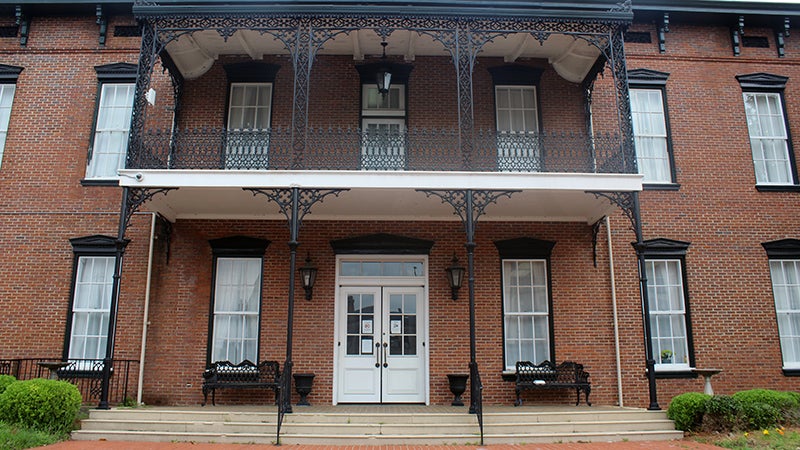Dinner meeting followed battle
Published 6:52 pm Saturday, April 24, 2010
by Christine Weerts
Special to the Times-Journal
Sheathing their sabers and riding under flags of truce, two Civil War generals who had earlier met in battle, met for dinner at a private home in Cahawba.
In a fascinating followup to the Battle of Selma, Union General James H. Wilson and Confederate General Nathan B. Forrest met six days later, on April 8, at the home of Col. Thomas M. Matthews, a plantation owner and Union sympathizer. The massive two-story Greek revival home had been built in 1843 as a wedding present for his bride by Richard Conner Crocheron.
Arranging the meeting by courier, Wilson invited Forrest to discuss an exchange of prisoners “and other matters” of mutual interest. The Union force was burdened with more than 2,400 prisoners from the Selma battle, many of whom were not soldiers but residents compelled to fight for their city.
Wilson, 27, a native of Illinois, had served most of the war as a topographical engineer. He was appointed to command a division of cavalry under Gen. Philip Sheridan in May 1864, and later was put in over the Alabama campaign to target coal mines, ironworks and ammunition manufacturers.
Forrest, 44, a Tennessean, had amassed a fortune as a slave trader and plantation owner before the war. He enlisted as a private in the Confederacy in 1861. Forrest was quickly given command of a cavalry regiment, and although he had no military training, showed excellent tactical skills. Forrest led many raids against Union forces and often won against superior numbers. Forrest and his 5,000 troops, most of whom were ill-equipped and scattered throughout the state, was the sole obstacle to the Union’s raid through Alabama.
Wilson’s memoirs, published in two volumes in 1912 titled, “Under the Old Flag,” give a first-person report of this remarkable meeting. The meeting is described in volume one in a chapter called “Last Campaign of the War.”
Arriving in the morning, Wilson was impressed by the hospitable Southern welcome he received from Col. Matthews.
Forrest arrived at 1 p.m. “well clad and admirably mounted.” Greetings were “reserved,” Wilson wrote , and noted that Forrest, “though carrying his left arm in a sling, gave the appearance of great firmness, excellent judgment and inflexible will.”
Over a “bountiful Southern dinner,” good cheer prevailed, formalities relaxed and embarrassment abated, so that by the time the meal was over “we were treating each other like old acquaintances,” Wilson wrote.
After the meal, the generals withdrew to the parlor for a long “guarded” conversation.
“It was easy to see that he was depressed,” Wilson wrote.
The Union general continued, “We had hardly shaken hands and taken our seats when looking me steadily in the face, he said: “Well, General, you have beaten me badly, and for the first time I am compelled to make such an acknowledgment. I have met many of your men, but never before one I did not get away with, first or last.”
Wilson replied, “Our victory was not without cost. You put up a stout fight, but we were too many and too fast for you.”
“Yes, I did my best, but, if I now had your entire force in hand, it would not compensate us for the deadly blow you have inflicted upon our cause by the capture and destruction of our great arsenal, foundries, workshops and storehouses at Selma,” Forrest said.
They spoke more of the battle they had just fought, and then Wilson suggested an exchange of prisoners. Forrest replied that he didn’t have the authority, but would send the message to his superiors. The exchange was not approved. General Wilson took all prisoners from Selma on the march by foot to Montgomery. When they tired, he paroled them home.
On taking leave of each other, Wilson noted Forrest’s bandaged arm, and asked what had happened.
The Confederate general answered, “A young captain of yours singled me out at Ebenezer Church and rained such a shower of saber strokes on my head and shoulders I thought he would kill me. While warding them off with my arm I feared that he would give me the point of his saber instead of its edge, and, had he known enough to do that, I should not have been here to tell you about it.”
Wilson warned him that most of his men knew him by sight and would gladly kill him in battle. To which Forrest said, “ I am much obliged to you, General, but I have no fear! I have faced death on a hundred fields and I am sure the bullet has not been cast which is to kill me.”
The following day, April 9, 1865, in the home of Wilmer McLean at Appomattox Court House, Va., Grant and Lee discussed the terms of surrender. Lee asked Grant to write out the terms, which the Union general did. Grant handed the document to Lee, and Lee wrote a letter formally accepting the surrender.
Wilson and Forrest were not aware of the war’s end for many days. Forrest surrendered his men on May 9, 1865 in Gainesville. On May 13, 1865, a picked company of Wilson’s command — the 4th Michigan — captured Jefferson Davis, president of the Confederate States of America, in Irwinsville, Ga., according to Harper’s Weekly.




